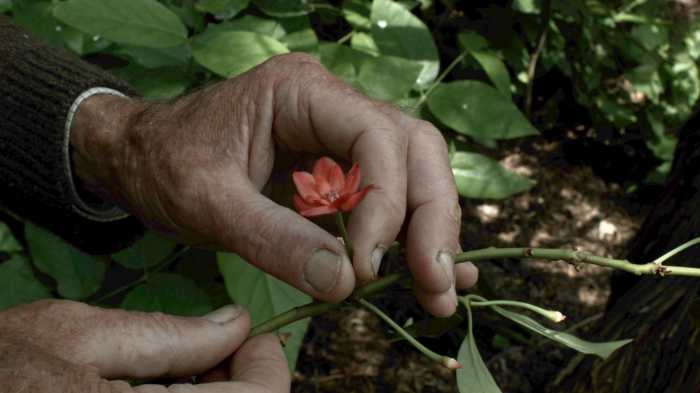Jean Dujardin and Gilles Lellouche face off in Cédric Jimenez’s “The Connection.” | DRAFTHOUSE FILMS
BY STEVE ERICKSON | A few weeks ago, the Film Society of Lincoln Center played French director Eric Rohmer’s “Comedies and Proverbs” series. While this shouldn’t have surprised me, I was still startled that Rohmer’s “Boyfriends and Girlfriends” outsold “Butch Cassidy and the Sundance Kid,” which played directly opposite it on another of their screens.
For a certain kind of cinephile, Rohmer defines French cinema: white middle-class people having lengthy talks about their love lives. (Arnaud Desplechin’s “My Sex Life, or How I Got Into an Argument” pushes this notion to the point of conscious self-parody.) I don’t wish to attack the late director, whose work is broader and more interesting than that pocket description would indicate. However, it’s noteworthy that “Boyfriends and Girlfriends” offers an idyllic view of the Paris suburbs that would become the subject of a wave of films about poor, angry young Arab and black men a few years later.
Americans’ view of French cinema is blocked by distributors, who act as gatekeepers, even if available choices are supplemented by series like the Film Society’s annual “Rendezvous with French Cinema.” In arthouse culture, Jean-Luc Godard’s extremely challenging “Goodbye to Language” was a minor hit, playing six months at the IFC Center. The mainstream comedies and thrillers the French themselves are entertained by are often harder to see.
Cédric Jimenez adds little in a riff on Friedkin’s “French Connection”
Cédric Jimenez’s “The Connection,” which riffs on William Friedkin’s “The French Connection,” is an exception. “Loosely based on real events,” which probably means it’s 75 percent made up, it wears its love of American genre cinema on its sleeve. But so did French New Wave films like Godard’s “Band of Outsiders” and Francois Truffaut’s “Shoot the Piano Player.” It would be great to report that Jimenez has found a similar kind of inspiration in American cinema, but the difference is that he has nothing of his own to bring to the table.
When “The Connection” begins in 1975, Marseille magistrate Pierre Michel (Jean Dujardin) deals with juvenile offenders, many of them drug addicts. He gets promoted to the organized crime division. He sees this as a new way to fight drugs, particularly if he can take down kingpin Gaetan Zampa (Gilles Lellouche). Zampa traffics huge amounts of heroin into the US. Helped by a large task force of cops, Pierre raids Zampa’s associates, but the man himself seems almost untouchable. As their struggle heats up, the lives of Pierre and his family are put in danger.
Jimenez’ direction reminds me of Michael Mann before Mann discovered digital video, He likes filling the screen with huge close-ups of the actors’ faces, sometimes making them so large they take up half the frame. His action scenes are a flutter of shakycam and quick cutting. When Jimenez gets ambitious, he relies on montage sequences stringing together action in different locations. The film’s violence is bloody but startling and abrupt.
For his two leads, Jimenez cast actors who physically resemble each other. Their haircuts and long sideburns look similar as well. The first showdown between Pierre and Zampa has a real charge to it. But after that point, “The Connection” keeps them apart. Its suggestion of a connection between lawman and crook is a familiar neo-noir trope, evoking John Woo’s “Face/ Off” and Mann’s “Heat.” Pierre is a recovering gambling addict, and his wife suggests that his legal pursuits have become a new form of addiction. The film takes this notion seriously for about 20 minutes, with Dujardin’s sweaty performance really selling it, then it goes back to contrasting Zampa hanging out with a crew of gangsters in nightclubs and Pierre relaxing with his children.
To use Neil Young’s phrase, “The Connection” shows the needle and the damage done. It’s an anti-heroin film. It also approvingly lifts a Nixon soundbite on the evils of drugs, which is symptomatic of a deeper flaw. It’s a celebration of the war on drugs, never recognizing that in some areas — American minority communities, present-day Mexico — the war has done as much damage as the drugs themselves. It presents the hunt for a dealer as a triumphant struggle without any acknowledgment that there’s likely another ambitious young man ready to become the next kingpin as long as demand for heroin persists.
There are several American cable shows about the lives of gangsters, breathlessly tracing their rise and fall with still photos, archival film, and interviews with Mafia historians, cops, and FBI agents. They manage to be both moralistic and hagiographic, always avoiding the root causes of poverty or drug abuse. “The Connection” plays like the fictional version of one of these shows, transposed to Marseille. At best, it’s a fun exercise in ‘70s nostalgia, with a great soundtrack and a Dujardin performance oozing conviction. At worst, it’s a reactionary drag.
THE CONNECTION | Directed by Cédric Jimenez | In French with English subtitles | Drafthouse Films | Opens May 15 | Landmark Sunshine Cinema, 143 E. Houston St., btwn. First & Second Aves.; landmarktheatres.com



































